Arab Paper Says EU's Borrell Will Visit Iran Soon For Nuclear Talks
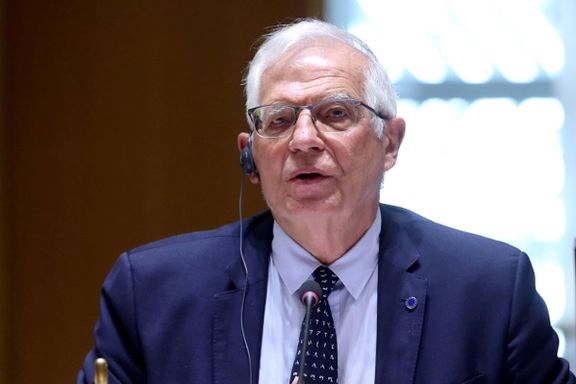
European Union’s foreign policy chief Josep Borrell will “most likely” visit Iran next week to discuss the stalled nuclear talks, an Arab newspaper said Thursday.

European Union’s foreign policy chief Josep Borrell will “most likely” visit Iran next week to discuss the stalled nuclear talks, an Arab newspaper said Thursday.
Al-Arabiya Al-Jadeed, a London-based publication owned by a Qatari company, quoting “well-informed Iranian sources” tweeted late Thursday that Borrell plans to discuss the revival of Iran nuclear talks stalled since March during his reported trip to Tehran.
Iranian government media and officials have not yet reacted to the report. Some Iranian news websites simply carried the Al-Arabiya Al-Jadeed’s report.
Diplomats were claiming that a draft agreement to return to the 2015 nuclear agreement was almost ready when talks broke up in March on Iranian demands that the US lift terrorism related sanctions imposed on its Revolutionary Guard. The United States has called the demand “extraneous” to the nuclear issue.
Meanwhile, Enrique Mora, Borrell’s deputy, tweeted a photo Thursday of having dinner in Brussels with US Special Envoy for Iran Rob Malley and Borrell.
Mora said in the tweet that the three had “in-depth conversation about JCPOA & regional perspectives in wider Mideast. Malley reiterated firm US commitment to come back to the deal.”
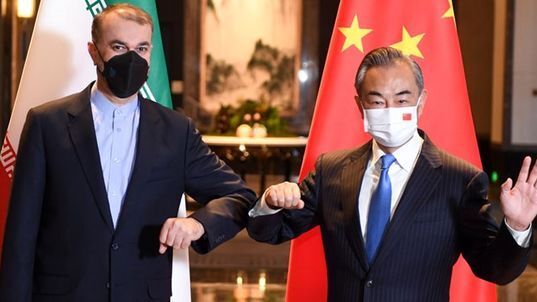
Chinese Foreign Minister Wang Yi says his country has urged the US to respond positively to Iran's "reasonable" concerns in the year-long nuclear talks.
Iran’s ambassador to China, Mohammad Keshavarzzadeh, said on Thursday that Wang made the remarks in a phone talk with Iranian Foreign Minister Hossein Amir-Abdollahian.
He said the BRICS summit – a conference attended by the heads of state of the five member states Brazil, Russia, India, China and South Africa -- the issue of Afghanistan as well as the latest developments in Iran nuclear talks were among the topics of the conversation.
While China supports pushing forward the Vienna negotiations to restore the 2015 nuclear deal, Beijing has kept close communication with Tehran since the talks stalled in March, reportedly because of Iran’s insistence for the removal of its Revolutionary Guard (IRGC) from the US list of Foreign Terrorist Organization (FTO).
Earlier in the week, Tehran again blamed Washington for lack of progress in talks, saying it is ready to resume negotiations to achieve a “good deal”. But a good deal for Iran means something very different from what the US says is possible.
The Biden Administration that came to office with a promise to restore the Obama-era Joint Comprehensive Plan of Action or JCPOA, says that it is ready to lift nuclear-related sanctions imposed by its predecessor but does not want to discuss “extraneous issues,” meaning sanctions imposed by the Trump administration over support for terrorism or other violations by Iran and Iranian entities.
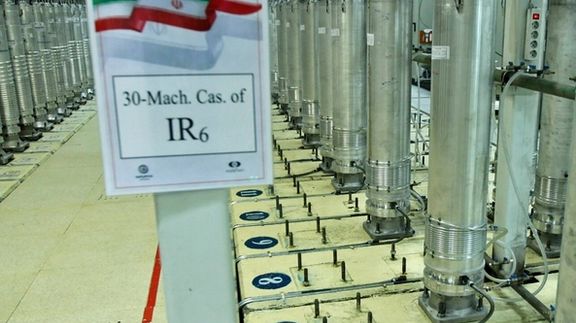
Iran has begun to employ advanced IR-6 centrifuges to enrich uranium at its underground Fordow site, the International Atomic Energy Agency reported Monday.
A confidential report seen by the Reuters news agency noted that the centrifuges were fitted with “modified sub-headers,” which allow rapid switches in enrichment levels, and that Iran had not as yet informed the agency (IAEA) what level of enrichment it planned.
The move follows a vote June 8 at the 35-nation IAEA board condemning Iran over failing to satisfy the agency over queries about uranium traces found at three sites linked to past nuclear work.
In response to the board’s resolution – passed against Chinese and Russian opposition – Iran’s acting IAEA ambassador Mohammad Reza Ghaebi said Tehran would make a “firm and proportional” response. Iran quickly informed the IAEA it was installing IR-6 centrifuges at the Natanz site and was removing some of the agency’s monitoring equipment.
Tehran told the IAEA Monday it had begun Sunday to feed uranium hexafluoride (UF6) gas into centrifuges at Fordow, a site dug into a mountain to shield it from attack. Iran earlier told the agency that its two cascades at the site would be used to enrich to 5 percent or 20 percent. Enrichment to 60 percent, close to the ‘weapons grade’ of 90 percent, has been done at Natanz.
The latest expansion in Iran’s nuclear program comes with a pause since mid-March in year-long talks in Vienna between Iran and world powers aimed at reviving the 2015 Iran nuclear deal, the JCPOA (Joint Comprehensive Plan of Action). Iran began breaching JCPOA limits in 2019, the year after President Donald Trump withdrew the US from what he called “the worst deal in history.” The JCPOA barred the use of relatively advanced IR-6 centrifuges, all enrichment above 3.67 percent, and any enrichment at Fordow.
‘Terrorist octopus’
With no sign of talks resuming to revive the JCPOA, Israeli Prime Minister Naftali Bennett has trumpeted what he calls the ‘Octopus Doctrine’ by which Israel, as he told a parliamentary committee this month, “has taken action against the head of the terrorist octopus and not just against the arms as was done in previous decades.”
The ‘Octopus Doctrine’ has seen drones and cyber-sabotage used in attacks on Iranian nuclear and military facilities, and is widely believed to have involved killing Iranian scientists, engineers and officers. Israeli media Friday warned tourists in Turkey not to leave their hotel rooms to avoid attacks and kidnapping by Iranian agents.
Accused domestically by both JCPOA supporters and opponents of lacking a ‘plan B’ should the nuclear talks fail; the Biden administration is reportedly sticking to its insistence on keeping Trump’s designation of Iran’s Revolutionary Guards as a ‘foreign terrorist organization.’ An Iranian initiative to restart the Vienna process reportedly involved Iran dropping its demand that the IRGC be delisted but insisting US sanctions be lifted from its construction arm, Khatam-al Anbiya.
With President Joe Biden due to visit Saudi Arabia and Israel in July, the US is encouraging greater coordination between the Israelis and some Gulf Arab states in defense against missiles and drones either operated by Iran or supplied to allies, Hezbollah, Ansar Allah (known as the Houthis), and Iraqi groups. Despite his stated aim of renewing the JCPOA, Biden is drawing closer to JCPOA opponents Israel and Saudi Arabia while Iran continues to expand its nuclear work.

Qasem Mohebali, an analyst in Tehran, says President Joe Biden is changing his approach and intends to put Iran under siege by creating a regional coalition.
According to Khabar Online, this is a U-turn by Biden who has so far not been attaching importance to Washington's old allies in the region. It appears that both sides have deemed the current situation good for mending their relations.
Mohebali said in his interview with Khabar Online that the developments in Ukraine as well as the suspension of Iran's nuclear negotiations have played their parts in bringing back Washington to its old policy of close ties with Saudi Arabia. The result, said Mohebali, will be a coalition between the United States, Israel and Saudi Arabia and other regional players.
During Biden's upcoming visit to the region, Israeli's will have a chance to convince Washington that returning to the JCPOA is meaningless and the US should exert more pressures on Iran, Mohebali said, while the United States could be able to convince Israel to refrain from provocative actions against Tehran.
As these concerns were being aired in Tehran, Israeli defense minister Benny Gantz told the Knesset on Monday that a regional air defense coalition is being formed with US leadership. The effort, he said, has already stopped some Iranian attacks.
This comes while the prospects for reviving the 2015 nuclear deal is becoming increasingly weaker, while Iran desperately needs to revive the JCPOA and have US sanctions lifted in a bid to improve its ailing economy.
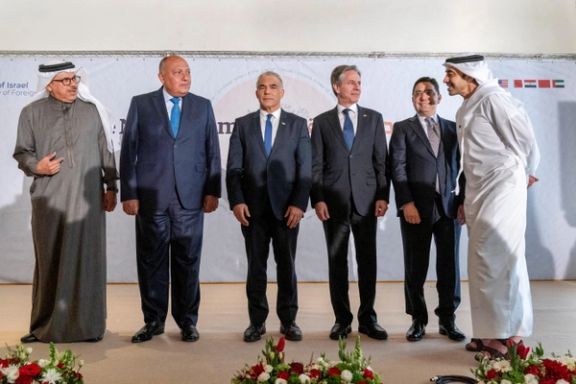
A former member of the Iranian parliament's National Security and Foreign Policy Committee, Hshmatollah Falahatpisheh, told Nameh News in an interview on June 20, that Iran will certainly be the big loser if no nuclear deal is reached.
Meanwhile, referring to Iran's defiant reactions to the June 8 IAEA resolution that condemned Tehran's lack of cooperation with the International Atomic Energy Agency, Falahatpisheh warned that "it is not the right time for Iran to stand against the IAEA. This will make Tehran's situation even worse."
Pointing out Tehran's weak position, Falahatpisheh said: "Once we could determine our own fate at the negotiating table, but now we have to wait and see what decisions are being made by lobbyists behind the scenes at the IAEA Board of Governors.
Explaining why Iran will be the loser if the negotiations are not fruitful, Falahatpisheh said: "All the agreements Iran signs with other countries, including long-term 20-year contracts, are being concluded under sanctions, so these cannot serve Iran's interests." He added that Iran missed all the chances for a rapprochement with the United States before the war in Ukraine. Now, all countries including Russia only think of their own interests."
He criticized Iranian officials' inaction in the current situation by saying, "It is as if they do not have a good understanding of the situation and do not see the weakening of Iran's currency on a daily basis. While prices are rising, the government increases taxes and redoubles the pressure on the people."
While Falahatpisheh stressed that the government should do away with slogans and take important political decisions to solve the country's problems. Meanwhile, lawmaker Somayeh Rafiei said in an interview with Rouydad24 on Monday: "The people can hardly tolerate the situation any longer…and they
are looking for results and the government needs to introduce essential changes."
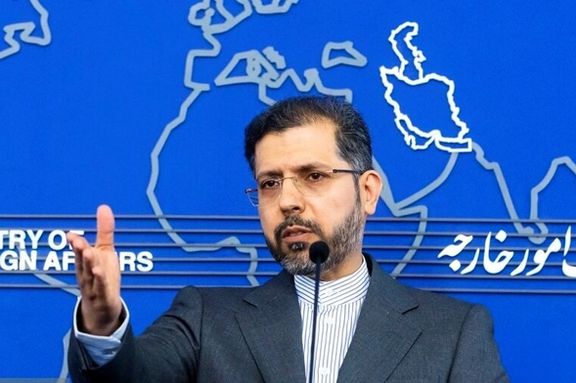
Tehran blamed Washington Monday for lack of progress in talks to revive the 2015 nuclear deal saying it is ready to resume negotiation to achieve a “good deal”.
"Even today, we are ready to return to Vienna to reach a good deal if Washington fulfils its commitments," foreign ministry spokesman Saeed Khatibzadeh said at his weekly televized news conference.
But a good deal for Iran means something very different from what the US says is possible. Year-long talks stalled in Vienna in March, reportedly because of Iran’s insistence to remove its Revolutionary Guard (IRGC) from the US list of Foreign Terrorist Organization (FTO).
The Biden Administration that came to office with a promise to restore the Obama-era Joint Comprehensive Plan of Action or JCPOA, says that it is ready to lift nuclear-related sanctions imposed by its predecessor and does not want to discuss “extraneous issues,” meaning sanctions imposed by the Trump administration over support for terrorism or other violations by Iran and Iranian entities.
Washington says it has made its final proposal to Tehran and awaits its decision. Even the Russian negotiator in the talks, Mikhail Ulyanov, says that 99 percent of all issues were resolved in Vienna before the negotiations stopped.
Middle East Eye reported on Sunday that Iran has dropped its demand for delisting the IRGC, “but has called for lifting of sanctions imposed by the US against Khatam-al Anbiya Central Headquarters,” the economic empire of the IRGC, which itself is implicated in IRGC's terrorism role.
If such a proposal has indeed been made by Iran, it does not appear that Washington is ready to entertain it. Last week, the State Department once again rejected the introduction of issues “extraneous” to the JCPOA.
The administration’s diplomatic approach toward Iran has come under questioning by Republicans and some Democrats who believe no concessions should be made to Tehran. The White House has recently appeared a bit more confrontational with Iran, imposing new sanctions on companies and individuals accused of helping Tehran to circumvent US sanctions.
Iran’s nuclear policy and indeed foreign policy is under the full control of Supreme Leader Ali Khamenei whose important pillar of support is the IRGC amid popular discontent and constant protests.
Khatibzadeh speaking about the achievements of the foreign ministry on Monday said, “The foreign ministry dedicated efforts to the lifting of sanctions. The foreign ministry has been the instrument of higher entities.” The term ‘higher entities’, in the Islamic Republic jargon, usually refers to the Supreme Leader and governmental bodies he controls, such as the Supreme National Security Council.
Speaking about President Joe Biden’s upcoming trip to the region, Khatibzadeh warned the United States and other countries “not to fall in a path designed” by Israel, which is most concerned about Tehran’s nuclear program and has vowed to stop its possible weaponization at any cost.
Iran’s efforts to improve ties with regional Arab countries which are also concerned about its nuclear, military and foreign policies, have not made much progress.
Khatibzadeh, speaking about diplomatic contacts with Saudi Arabia, the dominant Sunni power in the region, said it would be premature for Iran and Saudi Arabia to speak of reopening their embassies in each other's capitals, after they cut relation in early 2016.
Saudi Arabia, which has had cool relations with the Biden Administration is expected to use the president’s trip to change that.
"It is too early to talk about the reopening of embassies by Tehran and Riyadh," Khatibzadeh said, signalling that Iran’s relative isolation will continue.
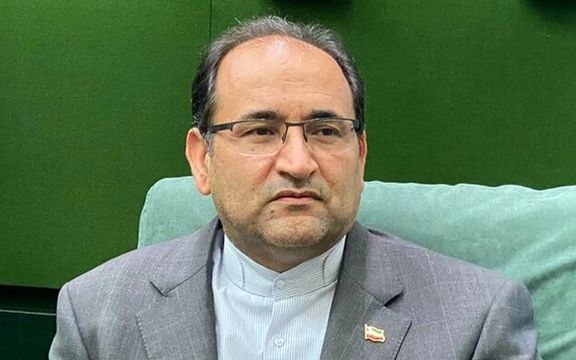
A senior Iranian lawmaker speaking about proposals to leave the Nuclear Non-Proliferation Treaty (NPT) has said such a move would provide “excuses to the West”.
Hardliner Iranian politicians have been suggesting that Tehran should withdraw from the NPT and even the 2015 nuclear deal with world powers known as the JCPOA as retaliation for being snubbed by the United Nations nuclear watchdog, the IAEA on June 8.
Jalil Rahimi Jahanabadi, a member of parliament’s National Security and Foreign Policy Committee told Etemad Online website on Sunday [June 19] that the IAEA resolution does not carry any legal and political risks for Iran.
The 35-nation IAEA Board of Governors passed the critical resolution after it determined that Iran has not cooperated in an investigation of its past nuclear activities.
So far, the government’s response to the IAEA was to disconnect many monitoring devices installed at its nuclear facilities by the UN watchdog, which in of itself was a significant move. But the noise about leaving the NPT has remained at the level of hardliner agitators and lawmakers.
One day before the vote on the resolution, a top hardliner in Iran, Hossein Shariatmadari, running the Kayhan Daily proposed leaving the NPT. He is Supreme Leader Ali Khamenei’s appointee at the flagship ultra-conservative newspaper, and many interpret his remarks as those endorsed by Khamenei’s office.
When the resolution passed on June 8, a large group of lawmakers also proposed to leave the NPT and stop cooperation with IAEA nuclear inspections and monitoring.
Later it was also revealed that former parliament speaker Ali Larijani and Supreme Council of national Security Secretary Ali Shamkhani lashed out at ultraconservative Saeed Jalili after he voiced support at the Expediency Council for the idea of Tehran exiting the Nuclear Non-proliferation Treaty (NPT).
But others among the Islamic Republic political elite warn that a drastic move against the NPT or the IAEA can send Iran’s nuclear file to the UN Security Council, which could lead to the restoration of international economic sanctions against the country. Those sanctions imposed in late 2000s and early 2010s carried the weight of the Security Council and were lifted only after Iran agreed to the 2015 nuclear deal, the JCPOA.
Jahanabadi, who appears to be one of the cautious politicians, tried to explain that the other lawmakers are making suggestions to the presidential administration, and it is not a process of forcing the executive to take steps on the issue of the NPT. He said that lawmakers are thinking to end voluntary cooperation with IAEA in the framework of the Additional Protocol and not within the NPT.
“Exiting the NPT for a country that has no intention to produce nuclear weapons, is not sensible,” he said. “Iran is not after inviting international challenges, and we should be aware that exiting the NPT will not solve any of our problems. Instead, it will provide an excuse for Westerners,” Jahanabadi added.”
He went on to say that Iran has no reason to go “from bad to worse”. If the IAEA shows no flexibility “exiting the NPT becomes an option, but we should not rush into these kinds of options now.”